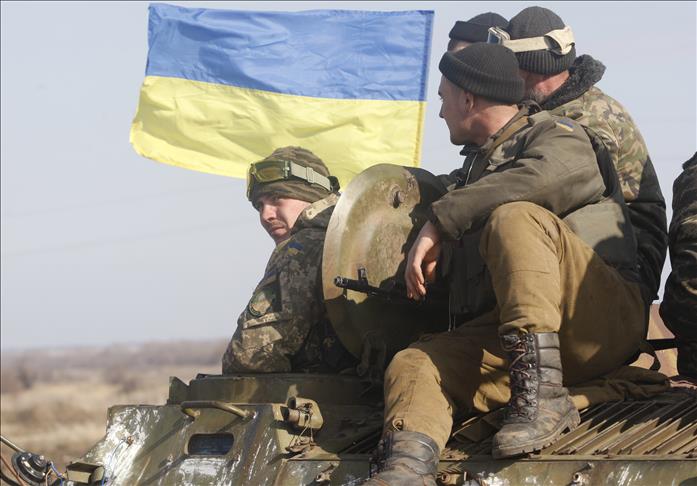US suspends plans to train Ukrainian military
Washington is eager to see Minsk ceasefire agreement fulfilled US Army Europe commander tells AA, but expresses doubts over fragile ceasefire

By Ayhan Simsek
BERLIN
The U.S. has suspended a military training mission in Ukraine in preference for a diplomatic solution to the Ukraine crisis, a senior American commander in Europe has told The Anadolu Agency.
U.S. Army Europe Commanding General Lt. Gen. Ben Hodges said Washington was keen to see a ceasefire deal signed in Minsk between Kiev and pro-Russian separatists get implemented.
“We are prepared to conduct training at the request of the Ukrainian government. But my government is obviously anxious to see the Minsk ceasefire agreement fulfilled and has put on hold this training mission,” Hodges said in an exclusive interview on Tuesday.
The U.S. was planning to train three Ukrainian battalions this month at a site close to the Polish-Ukrainian border. A U.S. paratrooper battalion assigned to the 173rd Airborne Brigade Combat Team in Vicenza, northeast Italy, has already been readied for the deployment.
Lt. Gen. Hodges said that the U.S. administration would closely monitor developments regarding the ceasefire in eastern Ukraine and would make a decision if or when the training mission goes forward.
“If the decision is not made in the next few days, then the training schedule would be delayed,” Hodges said, referring to plans already made for training in the middle of March.
However, he underlined that the paratroopers would remain ready for possible deployment.
“The U.S. army is prepared to carry out the mission if and when our government tells us to do so,” he said.
Hodges said if they moved forward with the plans, the military training would continue for eight weeks for each Ukrainian battalion, focusing on basic security as well as medical training.
- Doubts about ceasefire
Hodges expressed doubts about the future of the fragile ceasefire, blaming the separatists for not fully implementing the Minsk agreements.
“I think every soldier wants a diplomatic solution, we prefer that. But the rebels denied OSCE to conduct monitoring of the ceasefire. If the ceasefire is [only] working in some places, then the ceasefire is not working. It has to work everywhere,” he said.
Hodges accused Russia of providing military support for the separatists and argued that it would be impossible for the rebels to use sophisticated military equipment without the support of the Russian military.
“The rebels are obviously an extension of the Russian military. The equipment that has been used, the capability that has been employed, is obvious. Anybody that knows anything about the military can look with their own eyes and see what has been done there. That is very concerning,” he said.
Hodges claimed that Russia has backed separatists not only with arms but also with military advisors and troops.
“People are talking about foreign troops in Ukraine. The only foreign troops in Ukraine are Russian soldiers,” Hodges said.
“There are 29,000 in Crimea. Crimea is part of Ukraine. There are probably another 10,000 in eastern Ukraine, a combination of advisers and troops,” he added.
Western countries have long blamed Russia for instigating the conflict in Ukraine and supporting pro-Moscow separatist groups.
Moscow has denied the accusations and claimed that Ukraine was destabilized by Western states after pro-Russian president Viktor Yanukovych was driven from office in Feb. 2014 amid mass protests over seeking closer ties with Europe.
- ‘NATO needs Germany to step up’
Hodges praised NATO partner Germany’s active foreign policy since the beginning of the crisis in Ukraine, and also praised its military contribution to recent alliance measures to reassure allies in Eastern Europe amid growing perceived threats from Russian foreign policy.
“I think the alliance needs Germany to step up. I would like to see them be more active from a military leadership role,” Hodges said.
He emphasized that Germany should invest more on modernizing its armed forces, particularly its air force.
“I think the German defense minister Ursula von der Leyen is turning the ship, so to speak, in the right direction. But it is unacceptable for a country which is a leader to not have a more modern and effective air force; for example, better helicopters,” he said.
Public opinion in Germany had been largely against taking any military role in international conflicts but, in recent months, German government officials have been advocating a more active foreign policy supported by military measures.
Defense Minister von der Leyen announced last month that, from 2016 onwards, the German armed forces will act under a new strategy and take more responsibility for international "peace and stability."
The German opposition criticized the plans and warned that further militarization of German foreign and defense policy would be counterproductive and may lead to new confrontations in the region.
Anadolu Agency website contains only a portion of the news stories offered to subscribers in the AA News Broadcasting System (HAS), and in summarized form. Please contact us for subscription options.







